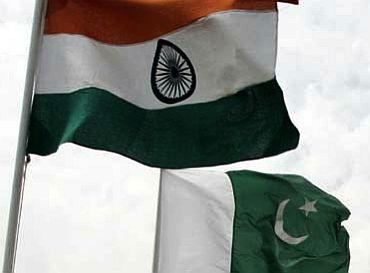 | « Back to article | Print this article |
 Despite the failure to ink the agreement on a new liberalised visa regime, India and Pakistan on Friday said that home secretary-level talks in Islamabad were fruitful.
Despite the failure to ink the agreement on a new liberalised visa regime, India and Pakistan on Friday said that home secretary-level talks in Islamabad were fruitful.
During the second round of home secretary-level bilateral dialogue, both sides agreed that terrorism posed a continuing threat to peace and security and full normalisation of relations.
They reiterated the firm and undiluted commitment of the two countries to fight and eliminate this scourge in all its forms and manifestations and bring those responsible for such crimes to justice.
The Pakistan side also provided an update on the ongoing trial and investigation in Pakistan in the Mumbai terror attacks case.
Both sides discussed the Judicial Commission's visit to India from March 14-21.
The Pakistani side, led by Interior Secretary K M Siddiq Akbar, noted that it had agreed in principle to receive a judicial commission from India. In this regard, modalities, mandate and composition of the commission will be worked out through diplomatic channels.
The Pakistan side reiterated its commitment to bring all the perpetrators of the Mumbai terror attacks to justice expeditiously in accordance with due process of law. For this, it was decided that to enhance cooperation between India's National Investigation Agency and Pakistan's Federal Investigation Agency.
The Indian delegation, led by Home Secretary Raj Kumar Singh, also provided information on the on-going Samjhauta Express blast case investigation.
The Indian side noted that the investigation in the case was still ongoing and that updated information would be shared with the Pakistan authorities concerned when the investigation was completed.
Besides terror, the bilateral talks also delved on other issues like establishing a secretary-level hotline between the two countries, which Islamabad said it would examine.
The two sides also welcomed the signing of the 'MoU on Drug Demand Reduction and Prevention of Illicit Trafficking in Narcotics Drugs/Psychotropic Substances and Precursor Chemicals and related matters', during the 8th Director General-level talks between the Narcotics Control Bureau of India and Anti Narcotics Force of Pakistan on Drugs Trafficking in September 2011.
It
The issues of fishermen lodged in jails and they straying into territorial waters too figured in the discussions.
Both sides welcomed the release of prisoners and fishermen, including those suffering from ailments, from their prisons. They noted the need to fully implement the understanding reached during the earlier round of talks in March 2011 so that the fishermen and the civilian prisoners who have completed their sentence, and whose nationality status has been confirmed by the respective governments and whose travel documents have been received, are released without delay.
It was also agreed that those fishermen who have completed their sentences will be released by both sides within three months along with their boats, except where the boats have been lost, damaged or confiscated by the courts. It was decided that those prisoners, whose nationality status could not be confirmed either due to lack of information or due to the physical disabilities of the prisoner concerned, would be transferred to charitable institutions in India and Pakistan pending confirmation of their nationality status.
The secretaries also exchanged views on the issue of inadvertent crossing of fishermen from both sides. The Pakistan side noted the invitation extended by the Indian Coast Guards for a meeting with the Pakistan Maritime Agency in June 2012 in New Delhi.
The next round of talks will be held in New Delhi.